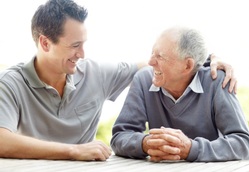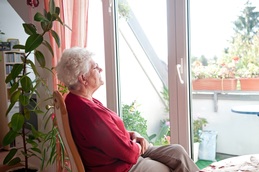Older people can benefit from getting to know their neighbour

Over 50 per cent of British people do not know their neighbours, and of the 3,000 people recently surveyed, 25 per cent have admitted to not even knowing their first name.
Lottery funded initiative The Big Lunch has carried out a survey investigating neighbourly relationships and although three quarters of people revealed that they would like more community spirit in their area, people have described shyness, lack of time and fears of not getting on as reasons for their non-existent bond with neighbours.
For older people, the break down in relationships with neighbours can have a negative impact on their quality of life, making them more isolated and lonely.
Independent Age director of policy, Simon Bottery: “We’re no less caring as people today, but society has changed meaning we can struggle to be good neighbours. We often lead busy lives, commute long distances and have more commitments, leaving little time to really get to know those living on our own streets.
“This is a real shame, partly because many older people suffer from loneliness but also because we're missing out on the rich and unique experience that many older people have to share.”
It is felt that there are various benefits from having stronger relationships with neighbours as older and younger people are brought together and the reputation of the area can be improved.
Sir Tim Smit, co-founder of The Big Lunch, said: “There was a time when everyone was very friendly with the people living next door.
“But as time has gone on, this seems to be becoming rarer, and it’s a shame to see that there are many people who haven’t got the time or are too nervous to get to know their neighbours. We’re keen to change this and were delighted when 8.5 million people took part in successful Big Lunches in their communities last June.”
Mr Smit continues: “Taking place on 2nd June this year, the idea is simple; if people start talking to each other, we see stronger, friendlier communities emerging in which people start to share things, from conversation and ideas to skills and resources.”

Behavioural expert Judi James, said: “It’s staggering that over half of us don’t know our neighbours, especially when we live in an era of crowded isolation, where we are often communicating with people via e-mail and text, at the same time as suffering feelings of loneliness.
“There’s no need to feel you’re taking a huge plunge when you start to get to know your neighbours. It’s the ice-breaker effect that is needed to convert strangers into possible friends or acquaintances. We need a good reason for knocking on the door and The Big Lunch is just that, the perfect ice-breaker that gets everyone involved in a positive experience.”
Over half of people would like to get to know their neighbour simply to make a new friend.
The majority of people surveyed commented that something unusual happened when they did knock on their neighbour’s door, such as making a new friend, being helped in trouble or even starting a new hobby. Problems older people encounter can be combatted with the help from their neighbours instead of causing them stress and worry.
The importance for people to have a relationship with their older neighbours is especially crucial at this time of the year when the winter months can hit isolated over 65’s the hardest.
Michelle Mitchell, charity director general of Age UK, said: “The winter can cause misery, avoidable illness and even death for too many older people. We’re hoping to inspire everyone to act now to do their bit to lessen the impact of winter for older people this year.
“There is something simple that everyone can do from popping in to check on an older neighbour to making time for older relatives.
“As we experienced as a nation last summer, it feels good to come together and help each other out. Small things and a friendly face make all the difference.”
The Olympics and the Jubilee are examples of occasions which have brought neighbours together through related activities and community events and it is hoped that this year The Big Lunch will have similar success in bringing the community together.
Latest News
 29-Jul-24
Dementia Bus gives carehome.co.uk staff insight into life with dementia
29-Jul-24
Dementia Bus gives carehome.co.uk staff insight into life with dementia
 01-Mar-24
Find out the top care homes in 2024
01-Mar-24
Find out the top care homes in 2024
 21-Mar-23
UK's top care homes in 2023 revealed
21-Mar-23
UK's top care homes in 2023 revealed
 03-Jan-23
carehome.co.uk launches free care helpline
03-Jan-23
carehome.co.uk launches free care helpline
 13-Dec-22
5 mins with Emily Whitehurst, chief operating officer for Constantia Healthcare
13-Dec-22
5 mins with Emily Whitehurst, chief operating officer for Constantia Healthcare